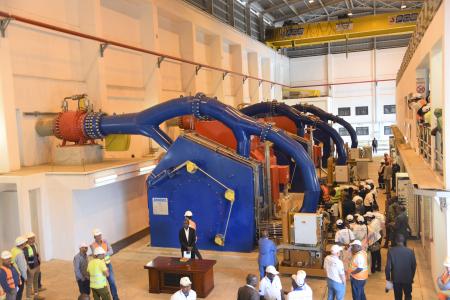Facebook Twitter (X) Instagram Somali Magazine - People's Magazine
Burundi plugs Jiji hydro to its national power grid, marking a major milestone in the country’s journey toward energy self-sufficiency and economic transformation. The 32.5-megawatt Jiji hydroelectric plant, inaugurated this week by President Évariste Ndayishimiye in Bururi Province, is expected to significantly boost electricity access for households, businesses, and industries across the country.
The Jiji plant is part of a twin-dam project that includes the 17MW Mulembwe facility, which is nearing completion. Together, the two plants will generate an estimated 235 gigawatt-hours of clean energy annually—enough to power 15,000 households, 7,000 businesses, and 1,700 industrial facilities.
Funded at a cost of $320 million, the project is a collaborative effort between the Burundian government and international partners, including the African Development Bank, European Investment Bank, World Bank, and the European Union. The initiative is also aligned with broader decarbonisation goals and aims to reduce Burundi’s dependence on imported fossil fuels.
President Ndayishimiye hailed the project as a “transformational leap” for Burundi’s energy sector, noting that the country’s installed capacity has more than doubled—from 47.5MW in 2020 to over 118MW in 2025. He also highlighted the complementary role of solar energy projects in Vugizo, Buhiga, and Mubuga, which are helping diversify the country’s renewable energy mix.

Development partners echoed the president’s optimism. Edward Claessen, head of the European Investment Bank in East Africa, described the project as a “strong signal for an investment-friendly climate” and a cornerstone of sustainable infrastructure development in Africa.
World Bank representative Hawa Cissé Wagué emphasized the social and economic impact of the project, stating that it would “improve access to electricity for the population, support industrialisation, job creation and economic growth”.
Despite delays caused by fuel shortages, landslides, and global supply chain disruptions linked to the COVID-19 pandemic and the Russia-Ukraine conflict, the project’s completion is being celebrated as a triumph of resilience and international cooperation.
As Burundi continues to expand its energy infrastructure, the Jiji and Mulembwe dams are expected to serve as catalysts for broader development, powering schools, hospitals, agribusinesses, and digital services while creating jobs and strengthening technical expertise in local communities.

